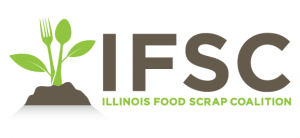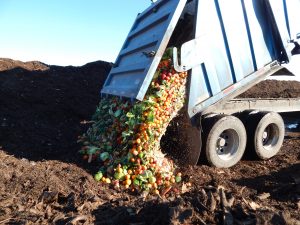
By Jennifer Nelson, July 13, 2020
Before coronavirus, Americans were faced with the challenge of how to handle 40.7 million tons of food waste. Several cities and states had started addressing wasted food, passing legislation and launching programs to divert millions of tons of bread, milk, fruits, meat, vegetables, condiments, and other food scraps sent to landfills each year.
As the coronavirus pandemic has changed how we live our lives, it has also led to significant changes within our food system and impacted food waste reduction efforts and food scrap composting in Illinois and across the country. We invite you to learn from Illinois Food Scrap Coalition member haulers and compost processors how their businesses have been impacted. Their responses have been summarized for clarity.
Haulers and processors interviewed:
Collective Resource Compost – Erlene Howard, Founder and Owner
Lakeshore Recycling Services – Joshua Connell, Managing Partner
Midwest Compost, LLC – Charles J. Murphy, President
Organix Recycling, LLC. – Rick Shipley, Chief Executive Officer
St. Louis Composting – Rachel Greathouse, Sustainability Coordinator, Total Organics Recycling
How has COVID-19 impacted organics hauling services?
At Organics Recycling, where most of their accounts are with supermarkets and food manufacturers, there was a 2-3 week period at the beginning of COVID where volumes were a little volatile as grocery stores adjusted to the panic buying and staffing challenges. Their non-supermarket generators have of course taken a hit. Some have closed during the shutdown while others scaled back their business, which lessened their volumes. Though no one has canceled their service, some clients have asked to pause it for the time being. However, as things begin to open up, many have now restarted again. Food manufacturers, on the other hand, have continued to produce at pre-COVID levels, some even higher than before, resulting in higher food waste volumes. Overall, Organix has been fortunate enough to have seen minimal impact, and their total volumes are tracking well with historical averages and future projections.
Lakeshore Recycling Services handles waste, recycling, and organics from residents and commercial clients. Their commercial routes, which include restaurants and schools, have been down, but they have seen an increase in grocery store volumes. In their residential customers, they have seen a 25-30% uptick in overall volume, but because food scraps are mixed with landscape waste, it’s difficult to track specific types of organics coming in. Joshua believes the residential increase is due to people spending more time, and consuming more, at home. LRS has seen a marked increase in yard waste this summer indicating that residents are sprucing up their lawns.
Collective Resource Compost, a food scrap hauler, has seen a sharp decline in volume due to the shutdown. At the end of last year, they were hauling 440 tons of food scraps in the last quarter, but this year at its lowest point, volume was down to 190 tons (in the second quarter). These are levels they have not seen since 2016, only 6 years after starting their business. For CRC, the dramatic slowdown is mostly due to commercial clients, schools, catering, and large office cafeterias shutting or slowing operations. They have also lost a few households over needing to tighten their purse-strings, but most residents have kept up their service as they stay and prepare food at home.
How has COVID-19 impacted your compost processing service?
 As people stay at home and take on lawn projects using finished compost, Midwest Compost has seen a 20-25% uptick in their compost sales. They have also seen a 50% or more increase in food scraps coming in. Though feedstock and sales are up, Midwest Compost continues to meet the demand while following CDC guidelines in their day to day operations and they have had positive cooperation from their customers as well.
As people stay at home and take on lawn projects using finished compost, Midwest Compost has seen a 20-25% uptick in their compost sales. They have also seen a 50% or more increase in food scraps coming in. Though feedstock and sales are up, Midwest Compost continues to meet the demand while following CDC guidelines in their day to day operations and they have had positive cooperation from their customers as well.
At Organix Recycling’s compost site, they have not been rocked by the global pandemic. Their incoming material and volumes have remained mostly consistent as well as sales for their finished compost.
 At St. Louis Composting where 100% of their organic material comes from commercial clients, they have seen a drop of about ½ to ⅔ in volume from pre-COVID numbers. Customers have continued to put service on hold and not many have come back on. However, customers haven’t cancelled service either, unless they have gone out of business. Customers see the importance of it and want to continue service, but just not sure when that will be.
At St. Louis Composting where 100% of their organic material comes from commercial clients, they have seen a drop of about ½ to ⅔ in volume from pre-COVID numbers. Customers have continued to put service on hold and not many have come back on. However, customers haven’t cancelled service either, unless they have gone out of business. Customers see the importance of it and want to continue service, but just not sure when that will be.
Do you foresee challenges in the future? If so, what are they?
Organix Recycling has modified their operational procedures and processes to comply with local laws/ordinances and to be as proactive as possible with their staff to keep them safe. But, on the business side, because they operate with mostly large, commercial customers who were not impacted by the shutdown, the composting operation itself has not been adversely affected.
St. Louis Composting has had a busier than normal spring this year with sales which is good news. But, because their incoming volumes are down this year, there might be challenges with meeting demand next spring.
Has COVID-19 brought any opportunities that benefit your operations?
Calls are coming into St. Louis Composting from interested customers who want to open accounts. They’re even getting calls from residents interested in composting at home since now they have more food waste. Though St. Louis Composting has not had residential clients in the past, they are considering opening their service to residents to make up for the spring and summer’s drop in feedstock.
Do you have any tips to share with our readers to help reduce food scrap contamination issues?
Collective Resource Compost has a resource on their website on how to do just that: https://collectiveresource.us/keep-your-compost-bin-contaminant-free/
For Lakeshore Recycling Services, contamination has been a non-issue as of late since most of the contamination was coming from restaurants and schools.
Illinois Food Scrap Coalition supports food scrap composting in Illinois during this challenging time. As food waste impacts shift throughout the food supply chain, haulers, and processors have seen their supply of food scrap feedstock change. We are glad to see that these businesses have been able to be flexible and adapt as needed. We will continue to follow your progress and support your businesses.
NATIONAL UPDATES
The work of the Illinois Food Scrap Coalition remains vital during these times of social distancing and community health uncertainty. We work to ensure policy and infrastructure are supportive of this industry. In part we do this by keeping an eye on national trends and identifying successful policies and programs to bring best practices to Illinois. See below for updates on the impacts of COVID-19 on food scrap composting in New York City, Boston and the state of Washington.
New York City Council Restores Funding For NYC Compost Project, Issue #25, July 7, 2020
In April, New York City (NYC) Mayor Bill DeBlasio suspended all public funding for composting in NYC as part of cuts to the City budget in response to COVID-19. The NYC Department of Sanitation’s Curbside Composting program was suspended for at least 14 months, from May 4, 2020, to June 30, 2021. Funding for the NYC Compost Project’s community composting sites was also cut, along with the GrowNYC Zero Waste Program, which manages residential food scraps drop-off sites at NYC’s Green Markets and other locations.
Petition-signing and public testimony from New Yorkers who didn’t want to lose their access to food scraps composting — along with the hundreds of volunteers who assist with the drop-off sites and community composting programs — helped get funds restored for the NYC Compost Project in early July.
From the front line: Garbage habits have changed during COVID-19, say trash and compost haulers: by Arianna MacNeill, Boston.com Staff, May 13, 2020
https://www.boston.com/news/coronavirus/2020/05/13/trash-compost-haulers-covid-19
In the curbside compost business, Black Earth Compost founder Conor Miller said the residential compost bins are getting heavier, and compost sales have been “through the roof.” Black Earth serves about 13,000 households, according to Miller. The company’s service area extends throughout eastern Massachusetts, according to its website.
There’s about 30 percent more compost coming in from residential pickup, according to Miller. This was welcome since half of the business’s commercial subscribers disappeared “overnight.” Black Earth has also seen people continuing to sign up for residential service.
Washington State’s Compost Procurement Law, BioCycle Connect, ISSUE #25, July 8, 2020
House Bill 2713, Compost Procurement and Use, was passed by the Washington State legislature in the 2020 session, becoming law on June 11. The procurement law ensures that compost created from municipal recycling programs moves onto state, county and city projects so that all of the benefits of compost can be captured. It also encourages cities with organics collection to enter into compost buy back agreements with their organics processors, closing the loop on their organics recycling programs.
What is Next for Illinois Compost?
 As people followed stay at home orders in Illinois, and now, as many continue to work remotely, this provides an opportunity to encourage practices that reduce wasted food and educate people about the value of food scrap composting. Now is the time to take action to support those municipalities that offer residential curbside food scrap collection by educating households about these opportunities and how to sort food scraps effectively.
As people followed stay at home orders in Illinois, and now, as many continue to work remotely, this provides an opportunity to encourage practices that reduce wasted food and educate people about the value of food scrap composting. Now is the time to take action to support those municipalities that offer residential curbside food scrap collection by educating households about these opportunities and how to sort food scraps effectively.
The United States Composting Council released a Factsheet April 2020, Residential Composting during COVID-19 answering the question, “Can I continue to compost at home during the pandemic?” And the answer is, Absolutely! There is essentially no risk of transmitting the disease though the composting or vermicomposting bin. This applies to composting in our backyards and having our food scraps hauled to be composted by a compost processor. So keep composting. Keep advocating for composting in your community. And definitely purchase finished compost to use in residential or commercial landscaping projects!
Jennifer Nelson is a founding Board Member of the Illinois Food Scrap Coalition,works for Seven generations Ahead and co-facilitates the Wasted Food Action Alliance. Thank you to the contributors above in this article:
Funded through the Searle Funds at The Chicago Community Trust, Food:Land:Opportunity is a collaboration between Kinship Foundation and The Chicago Community Trust.
